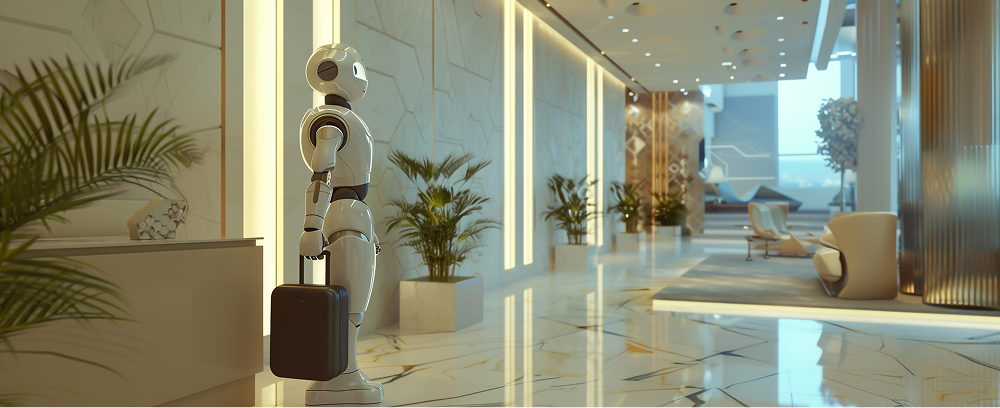Walk into most hotels today and you’ll see the signs of AI. We’re talking about real tools that help guests and make hotels run better.
Take chatbots, for example. They’re not perfect, but they handle basic questions pretty well. Guests can ask about pool hours or order towels without calling the front desk. Hotel staff love this because they get fewer routine calls.
Pricing has gotten smarter too. Hotels used to guess at room rates. Now AI looks at events in town, weather forecasts, and booking patterns. Rates change automatically based on demand. Guests might pay more during big conferences, but they also find better deals during slow periods.
Some hotels use AI to predict problems before they happen. The system might notice an elevator making weird noises and schedule repairs. Or it flags rooms that need extra cleaning based on guest feedback patterns.
The biggest win? Personalization that doesn’t feel creepy. Return guests find their favorite room type available and get restaurant suggestions they actually like. It’s not magic – just good use of data from previous stays.
What Is AI in Hospitality?
AI in hotels is basically smart computer technology that makes things run better. It’s like your hotel’s digital assistant that never sleeps. It handles boring stuff like adjusting room prices and answering basic questions so your staff can focus on guests.
The use of AI in the hotel industry goes way beyond just automation. It’s like having someone who remembers every guest’s preferences. AI in hotel operations covers almost everything now. Those chatbots that pop up on websites? That’s AI. It can even change the prices based on how busy the weekend will be.
Examples of AI in hotels are everywhere once you start looking. Some places use it to predict when elevators might break down. Others have automated check-ins that work faster than the front desk. Smart thermostats adjust temperatures in empty rooms to save energy. It’s all happening quietly in the background.
However, AI chatbots in hotels aren’t trying to replace friendly staff. They just handle any question, so that real people can help with bigger problems. The benefits of AI in hotel management are pretty obvious. The whole market went from $90 million in 2023 to an expected $8 billion by 2033. That’s massive growth for a reason.
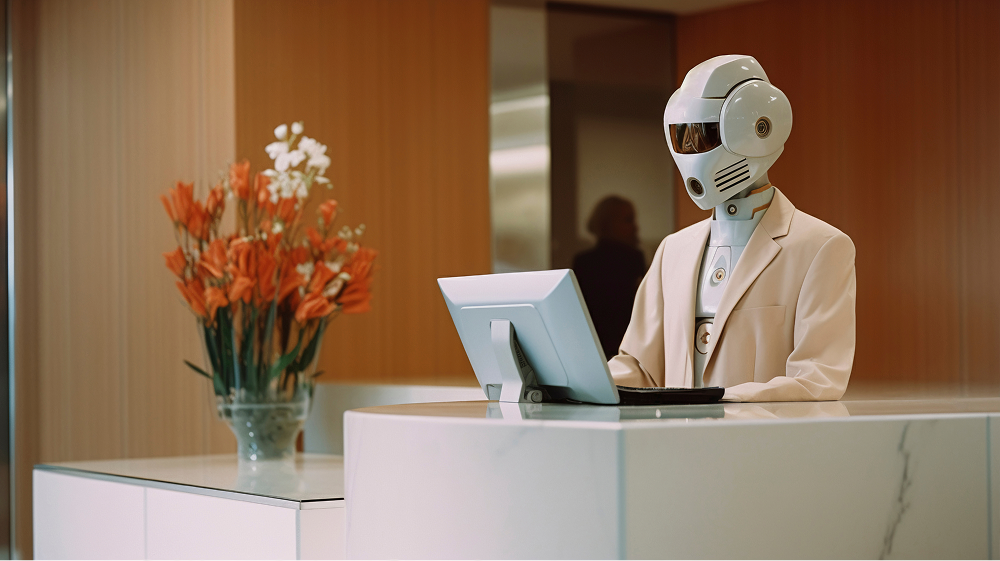
How does AI improve the experience of guests?
AI makes hotel stays feel more personal and hassle-free. When you walk into your room, the temperature is already set just how you like it because the system remembered your last visit. No more fumbling with complicated controls.
How can AI enhance the guest experience in hotels? It starts before you even arrive. AI chatbots answer your questions instantly – no waiting on hold to ask about pool hours or WiFi passwords. They work 24/7, so you get help at 2 AM if needed.
How is AI transforming the guest experience in hotels during your stay? Smart systems learn what you want. Love room service coffee at 7 AM? It suggests ordering ahead. Need restaurant recommendations? AI knows you’re vegetarian from your profile and suggests places that match.
The check-in process gets smoother too. Some hotels let you skip the front desk entirely using AI-powered mobile apps. Your room key goes straight to your phone. AI chatbots enhance the guest experience in hotels. They handle simple requests like extra towels or late checkout, leaving staff free to solve bigger problems and create those special moments that make trips memorable.
What are the advantages of AI in the hospitality industry?
The benefits of AI in hotel management are showing up in real ways across the industry. Here’s what hotels are getting from these systems.
Guest Help That Never Sleeps
Small hotels can’t pay someone to sit at the front desk all night. AI chatbots handle the simple stuff – pool hours, WiFi passwords, directions to the elevator. When guests need something complex, the system creates a ticket for morning staff to handle.
Better Guest Records
Hotels used to scribble notes on index cards about what guests liked. Mrs. Johnson wants a quiet room. Mr. Davis needs extra towels. Those cards got lost or thrown out. AI keeps this information and pulls it up every time these guests book again.
Smarter Cleaning Schedules
Housekeeping supervisors know which rooms are trouble. Some guests trash the place. Others barely touch anything. AI reads guest comments and creates cleaning priorities. Rooms that have complaints about cleanliness get extra attention next time.
Pricing That Makes Sense
Hotel managers used to guess at room rates. Too high and rooms stay empty. Too low and you lose money. AI watches what’s happening around town – concerts, conferences, road construction – and suggests prices that actually work.
Reports That Matter
Monthly reports used to take days to put together. AI pulls numbers automatically and spots problems fast. Guest satisfaction dropping in housekeeping? Revenue down in the restaurant? Managers see these issues right away instead of weeks later.
Marketing That Works
Sending the same promotion to everyone is expensive and annoying. Business travelers don’t care about pool parties. Families don’t need meeting room discounts. AI figures out who wants what and sends offers that people actually use.
Security That Pays Attention
Security guards can’t watch every camera all the time. AI spots weird behavior and sends alerts. The system can flag everything that you need. Guards check real problems instead of staring at empty hallways.
Bills That Don’t Hurt
Energy costs eat up hotel profits. AI turns down heat in empty rooms and dims lights in unused areas. The building stays comfortable for guests while cutting utility bills by real amounts.
Catching Problems Early
Guest complaints cost money and reputation. AI notices patterns before they blow up. Three housekeeping complaints this week? Time to retrain staff. Food quality scores dropping? Check the kitchen procedures.
Using Stuff Efficiently
Hotels waste a lot – towels, soap, electricity, food. AI tracks usage patterns and finds the waste. Maybe certain rooms use twice as many towels. Maybe the pool heater runs when nobody’s swimming. Small fixes add up to big savings.
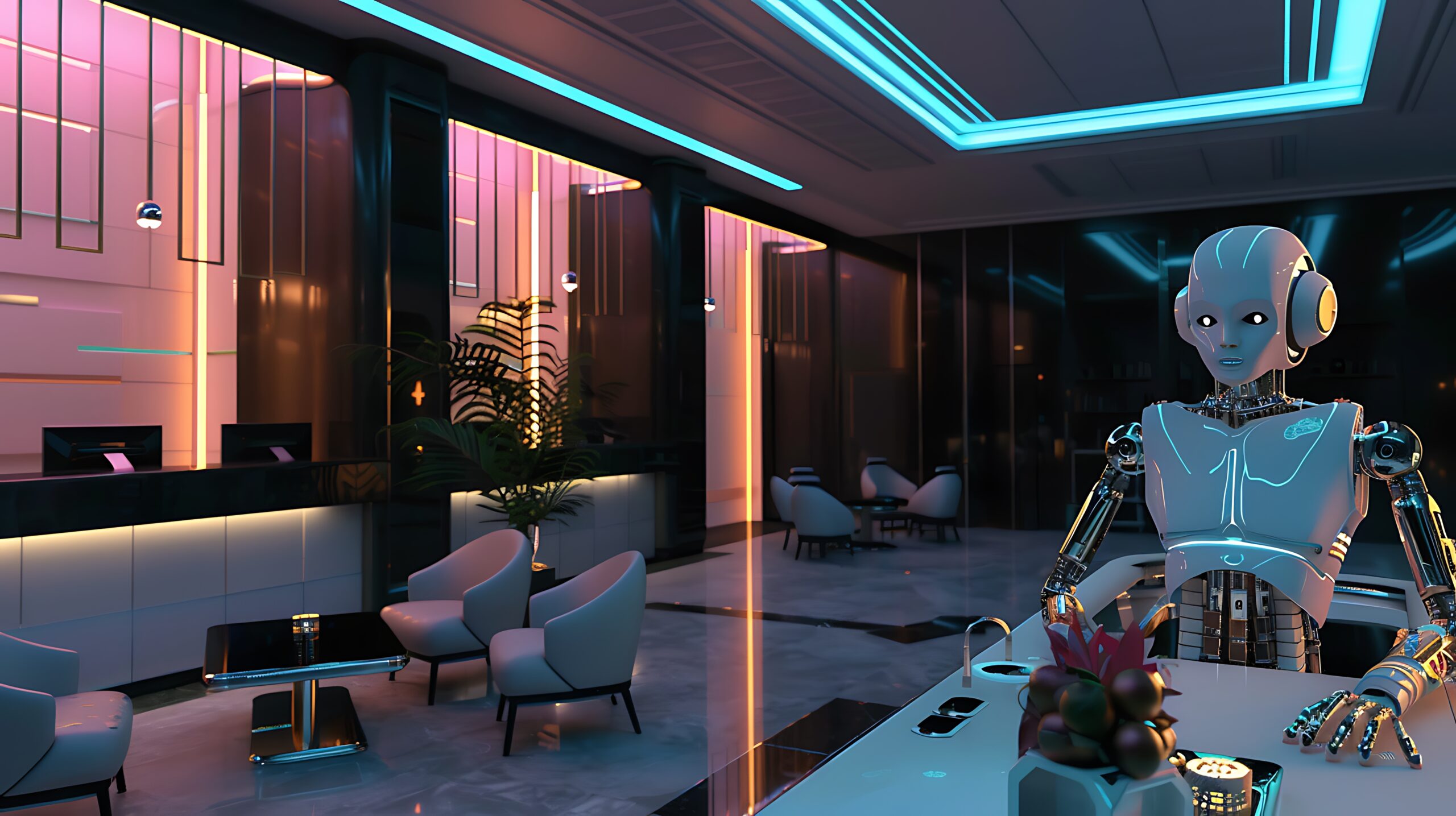
Use Cases of AI in Hospitality
Hotels are using AI everywhere now. These aren’t test projects anymore – they’re real solutions that guests see every day.
Chatbots and Virtual Assistants
Those chat boxes on hotel websites answer questions instantly. Guests ask them about pool hours or parking fees. No need to pick up the phone. Meanwhile, the systems handle dozens of conversations at once. However, complicated requests still go to human staff during regular hours.
Voice-Activated Room Controls
If you need to turn off the lights now, just ask AI. No more hunting for light switches in dark rooms. Some hotels also let people order towels or room service this way. But the technology works best for simple commands that don’t need much back-and-forth.
AI-Powered Recommendation Systems
These tools analyze what guests usually book and suggest similar things next time. For instance, gym users get fitness class alerts. Restaurant lovers see special menu items. These offers are very useful as they match real spending habits.
Smart Room Customization
Regular guests get rooms that already feel familiar. The temperature is right. The lighting looks good. TV channels match what they watched last time. Moreover, this happens automatically across every hotel in the chain.
Intelligent Energy Management
Empty rooms don’t need full heating anymore. Conference spaces dim their lights when nobody’s there. As a result, hotels save 20-25% on energy bills. Yet guests never notice the difference in comfort.
Robotic Process Automation
Software now handles boring office work. Invoices get processed automatically. Inventory counts itself. Staff schedules appear without human input. Therefore, employees spend more time actually helping guests instead of doing paperwork.
Revenue and Pricing Management
Hotel room prices used to stay the same for days or weeks. Not anymore. Now they shift every few hours based on what’s happening locally. Comic convention this weekend? Prices jump up by Thursday afternoon. Snowstorm cancelled flights? Rates drop within hours to attract stranded travelers. The system does this automatically while revenue managers focus on bigger strategy decisions.
Predictive Maintenance
Remember when elevators broke down during checkout rush? That happens less now because machines send early warnings. Once the ice machine makes grinding sounds, maintenance gets a notification before it dies completely. Kitchen freezers report temperature fluctuations that signal compressor problems. Instead of emergency repairs during busy periods, technicians fix things during quiet time.
Facial Recognition Technology
Walking up to your room door and having it unlock when it sees your face feels pretty futuristic. Some hotels rolled this out for keyless entry. The same technology recognizes returning VIP guests in the lobby so staff can greet them personally. Security applications identify banned individuals or people acting suspiciously. Still, many properties avoid facial recognition due to guest privacy concerns and legal restrictions in certain states.
Automated Surveillance
Security guards used to spend hours watching blank hallways on multiple screens. Now the cameras do the watching and only alert humans when something actually happens. Someone rattling door handles at 2 AM? The system flags it immediately. Person sitting in the parking garage for three hours? Security gets notified. Guards can patrol instead of being glued to monitor screens.
Augmented Reality Guest Experiences
Large resort properties can feel confusing. Guests wander around looking for the spa or business center. AR apps solve this by showing directions through your phone camera. Point it down a hallway and arrows appear showing where to turn. Some hotels let you preview rooms before booking by virtually walking through them. It’s particularly helpful in sprawling casino resorts where everything looks the same.
Kitchen and Delivery Robotics
Chain restaurants need consistent food quality across locations. Robotic cooking equipment helps with this – french fries come out the same every time. Room service delivery robots navigate hotel hallways carrying orders to guest floors. They’re slower than humans but work all night without breaks. The robots handle repetitive tasks while chefs focus on menu creativity and food presentation.
Robotic Cleaning Solutions
Round vacuum robots work through the night while guests sleep. Larger scrubbing machines clean conference room floors and pool decks during off-hours. The equipment handles basic maintenance cleaning. Human housekeepers still deep-clean guest bathrooms and make beds – tasks that need personal attention and flexibility.
AI Event Planning Tools
Planning a 200-person wedding used to involve lots of guesswork about food quantities and room setup. AI tools suggest realistic numbers based on similar past events. Corporate conferences get optimized layouts that encourage networking. The system remembers what worked well before and flags potential problems early. Event coordinators spend less time on logistics and more time making sure everything runs smoothly.
Crowd Flow Management
Using a hotel pool during peak hours used to feel quite miserable. Hotels now track usage patterns and suggest better times through their apps. “Pool typically less crowded between 10 AM and noon” appears as a helpful notification. Restaurant reservations get spread throughout the evening instead of everyone wanting 7 PM tables. Guests appreciate avoiding crowds and hotels provide better service.
Predictive Loyalty Engagement
Loyalty programs used to wait until members actually left before trying to win them back. Too late by then. Now the systems spot warning signs early – fewer bookings, lower spending, complaints going unresolved. At-risk members get personal calls or special offers before they defect to competitors. It costs much less to keep existing customers than acquire new ones.
These applications demonstrate how hotels tackle everyday operational challenges through technology. Guest experiences improve while hotels reduce labor costs and prevent problems before they escalate.
Real-World Examples
Hotels work with specific AI companies to solve everyday problems. Here’s who’s making things actually work better.
Visito

Guests already spend their day on WhatsApp and Instagram. So Visito lets hotels chat with them there instead of forcing everyone to use hotel apps. Most conversations get handled automatically – stuff like “What time is breakfast?” or “How much for tonight?” Guests can even book rooms without leaving their favorite messaging app. Hotels cut their customer service costs by 90% because the system handles routine questions.
Aiosell

Hotel sales teams used to waste hours calling people who weren’t really interested in booking. Aiosell figures out which leads are serious about spending money. It writes personalized emails and tracks what messages actually work. Sales people can focus on closing deals instead of cold calling random prospects.
EasyWay

Try running a hotel in Miami or Las Vegas where guests speak 20 different languages. EasyWay handles conversations in over 100 languages without needing human translators. A guest from Germany can text in German and get help with their reservation. The system doesn’t make translation mistakes that cause booking problems.
Myma.ai
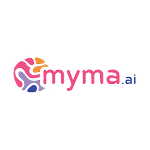
Most hotels juggle five different systems for guest communication. Email here, social media there, website chat somewhere else. Myma.ai puts everything in one place. From the first “Do you have availability?” message to the “Thanks for staying with us” follow-up, it all flows through one system. Hotel staff don’t spend their day switching between different platforms.
Connie the Concierge

Some Hilton hotels have actual robots standing in their lobbies. Sounds weird, but Connie works pretty well. She answers basic questions about nearby restaurants and hotel facilities. Kids love talking to her. When someone asks something complicated, she gets a human staff member to help. It’s more about novelty than replacing people.
Ivy the Direct Messenger

Not everyone wants to download hotel apps on their phone. Ivy works through regular text messages that any phone can handle. Guests text questions and get instant answers. Multiple people can text at the same time without the system getting confused. Simple but effective.
Tripleseat

Wedding planners used to guess at pricing for events. 150 people for dinner? Maybe charge $8,000? Tripleseat looks at similar past events and suggests realistic prices. Corporate parties, weddings, birthday celebrations – the system knows what worked before and what didn’t. Event coordinators spend time making sure everything runs smoothly instead of doing math in spreadsheets.
FLYR Hospitality
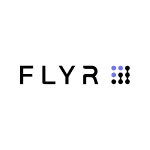
Hotel managers used to change room prices based on experience and hunches. FLYR watches thousands of data points and suggests better rates. Big concert coming to town? Prices should go up by Tuesday. Convention got cancelled? Drop rates fast to fill rooms. The system makes these decisions faster than humans can process all the information.
MARA Solutions

Someone needs to respond to every online review, but writing individual responses takes forever. MARA reads each review and writes a reply that sounds like it came from the hotel manager. Positive reviews get thanked properly. Complaints get addressed with real solutions. The hotel’s online reputation stays strong without anyone spending hours typing responses.
Canary Technologies

Nobody enjoys waiting in line to check into their hotel room. Canary lets people check in through their phone before they even arrive. Room keys work through the same app. Staff can help guests with real problems instead of processing routine check-ins. The front desk stays busy with important stuff instead of paperwork.
Duetto

Setting room prices used to require lots of guesswork and spreadsheets. Duetto watches competitor rates, local events, and booking patterns all at once. The recommendations make sense because they’re based on actual market data. Revenue becomes more predictable and hotels avoid leaving money on the table.
Cloudbeds

Small hotels can’t afford big IT departments but still need modern management systems. Cloudbeds works right out of the box without technical setup. Inventory tracking, guest messages, and performance reports all happen automatically. Independent hotels can compete with big chains using similar technology.
Visiting Media

Hotel marketing used to be spray-and-pray advertising that reached random people. Visiting Media finds prospects who actually travel and have money to spend on hotels. The ads get personalized based on what each person might want. Marketing budgets work harder because they target the right audience.
Actabl

Hotel managers get buried in reports and data that don’t tell them what to do next. Actabl sorts through all the numbers and highlights what actually matters. Guest satisfaction dropping in housekeeping? Revenue trends changing by season? The important stuff gets flagged automatically so managers can take action.
Inn-Flow

Hotels either run out of supplies at the worst times or waste money buying too much stuff. Inn-Flow predicts what each property needs based on occupancy patterns and usage history. Towels, cleaning supplies, coffee for the lobby – everything gets ordered at the right time in the right quantities.
Hoteza

Keeping track of guest preferences manually becomes impossible after a few hundred customers. Hoteza remembers who likes quiet rooms, who spends money at the spa, and who might be thinking about switching to a different hotel chain. The system suggests when to offer special deals or upgrade someone to keep them happy.
These companies work because they solve specific problems that hotel staff deal with every single day.
What hotel brands are using AI?
Big hotel chains are all trying AI now. Some do it well, others not so much. Here’s what they’re actually doing.
Marriott International

Marriott spent over a billion dollars on tech this year. That’s a lot. Their Renaissance Hotels have this AI thing called RENAI. It tells guests about local restaurants and events and does it pretty good. They put chatbots on their app too. You can ask basic questions and get answers right away. Some rooms let you change lights and temperature by talking.
Hilton Worldwide

Hilton has an AI robot named Connie. She sits in lobbies at a few hotels. Kids think she’s awesome. Adults ask her questions once then move on. But Connie knows tons about nearby restaurants and hotel stuff. IBM built her brain. She learns from every conversation. Hilton also lets you unlock rooms with your phone instead of plastic cards.
Accor Hotels

Accor fixed their terrible phone system with AI. Before, you’d wait forever to talk to someone. Now bots handle most calls about reservations and basic stuff. They made a trip planning tool for their website too. The coolest part is AI helps them waste less food. One hotel in Dubai cut food waste by 13% in five months. That’s real money saved.
InterContinental Hotels Group (IHG)

IHG uses AI mostly for pricing. Room rates change based on what’s happening in town. Their app remembers what you liked last time. Then it suggests similar hotels when you book again.
The Ritz-Carlton

Ritz-Carlton gets all of Marriott’s AI tools since Marriott owns them. But they’re careful about it. Rich people still want human service. So AI just helps staff know your preferences before you say anything.
Choice Hotels International

Choice keeps it simple. AI handles pricing and basic customer service. Most of their hotels are franchises. So they focus on tools that don’t cost owners a fortune to use.
Radisson Hotel Group

Radisson does the standard stuff. Chatbots answer questions. Computers set room prices. Systems predict when elevators need fixing. Nothing special but guests seem fine with it.
Kempinski Hotels

These luxury hotels use AI quietly. It tracks what guests want and predicts needs. But you never really see the technology. Human staff still do everything face-to-face.
Hotels that use AI for boring tasks do better. Their people can focus on making guests happy. Hotels trying to replace humans with robots usually learn that guests hate it. People want efficiency but they still want to talk to actual people when things matter.
What are the disadvantages of AI in the hospitality industry?
AI in hotels creates real problems that nobody talks about much. Here’s what actually goes wrong.
Data Protection Issues
Hotels collect massive amounts of personal stuff – credit cards, passport numbers, where you like to stay, what you spend money on. AI systems need all this data to work right. But keeping guest information safe is incredibly difficult. One security breach exposes thousands of people’s private details. Many countries have tough laws about using customer data. Hotels get caught between following these rules and actually using AI effectively.
Security Risks
Criminals target hotel systems because they contain valuable guest information. AI creates new attack points for hackers. Smart room controls, mobile check-ins, and connected devices give bad guys more ways to break in. When these systems get compromised, entire hotels stop working. Guests can’t access rooms. Reservations vanish. Credit card numbers get stolen. Recovery takes weeks.
High Costs
AI technology adoption can drain budgets fast. Hotels sometimes have expensive software which must be upgraded as long as hardware. Staff training takes months and costs plenty. Maintenance expenses never end. Small hotels can’t afford these systems at all. Even large chains struggle with the expense. Lots of AI projects get cancelled because the money runs out.
Constraints of AI-Based Customization
AI tries predicting what guests want but frequently gets it wrong. The system might suggest expensive restaurants to budget travelers or spa services to business people in a rush. AI can’t read situations like humans can. It makes guesses based on incomplete data. Guests get frustrated when technology offers useless recommendations instead of actual help.
Opposition from Employees
Hotel staff fear losing jobs to machines. Workers resist learning systems they think will replace them eventually. Some employees deliberately sabotage AI projects out of fear. Training becomes nearly impossible when people won’t cooperate. The technology only succeeds when human staff support it, but many refuse.
These challenges explain why many hotels approach AI cautiously. The technology offers benefits but brings serious risks that can damage both operations and guest relationships.
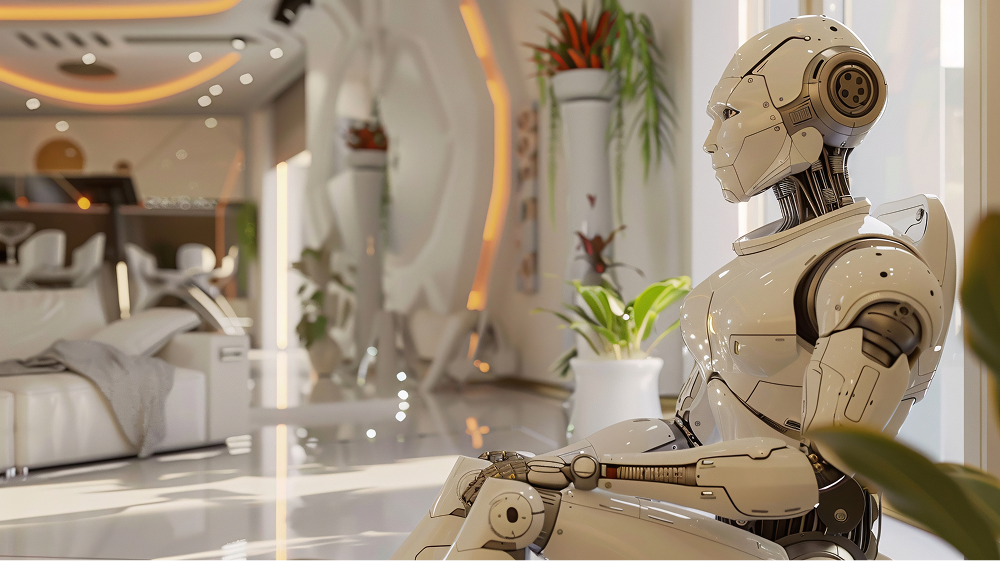
What should be considered when implementing AI in hotels?
Hotels that rush into AI usually mess it up badly. Here’s what you need to figure out before spending a fortune on technology that might not even work.
Requirements Assessment
Don’t buy AI just because your competitor down the street has a robot in their lobby. Figure out what’s actually broken first. Are guests complaining about long check-in lines? Do staff spend all day answering the same basic questions? Is your pricing all over the place? Write down real problems, not imaginary ones. Some hotels discover they need to fix their WiFi before worrying about artificial intelligence.
Scalable Solutions
Pick stuff that grows with you. A system that works great for your single property might crash when you open a second location. Cloud-based solutions usually handle growth better than programs installed on individual computers. Think ahead too. Will this work when you have five properties? Can it handle Christmas week when bookings go crazy? Don’t buy systems you’ll have to replace in two years.
Results Measurement
Decide how you’ll know if this thing actually works. Not just “it seems better” but real numbers. Are guests checking in faster? Do more people book directly instead of using booking sites? Are satisfaction scores going up? Track specific stuff before you install anything. Otherwise you’ll never know if you wasted your money. Some hotels spend thousands on chatbots that actually annoy guests more than help them.
Insights Extraction
AI spits out tons of data but most hotels don’t know what to do with it. Plan who’s going to read all these reports and actually make changes based on what they find. Data that sits in computer files helps nobody. Someone needs to look at guest patterns, figure out trends, and make business decisions.
Contract Review
Read the fine print before signing anything. Who owns your guest data once it goes into their system? What happens when you want to switch to a different company? Some AI vendors make it nearly impossible to leave or claim they own information about your customers. Get a lawyer to check contracts. This stuff matters more than you think.
Risk Management
What happens when the AI breaks down? Because it will break. Have backup plans ready. Train staff on what to do when systems crash. Make sure you’re following privacy laws in every place you operate. Document everything properly for inspections. Risk planning is boring but prevents disasters that cost way more than the original technology.
Easy to Use
Technology that your staff hates won’t work no matter how smart it is. Pick systems that are actually simple to use. Test everything with real employees before going live. Get honest feedback from front desk people, housekeepers, and managers. If they won’t use it, you’ve wasted your money.
Customization Options
Your hotel runs differently than every other hotel. Look for AI that adapts to how you actually work instead of forcing you to change everything. Can it learn your specific needs? Does it play nice with your existing software? Flexibility prevents expensive workarounds and frustrated employees.
Smart AI implementation takes time, planning, and realistic expectations. Hotels that do this right see real benefits. Hotels that rush usually create expensive headaches.
What is the future of AI in hospitality?
AI in hotels is about to get really interesting. But don’t expect everything to change overnight. We’re looking at gradual improvements over the next decade.
Hotels will know you better than your own family. Walk into your room and everything adjusts automatically – temperature, lights, music. The system remembers you prefer it cool and hate bright lights. Restaurant staff will suggest dishes you’ll actually like based on previous meals. It sounds creepy but guests seem to love it when done right.
Everything behind the scenes will work together seamlessly. Broken elevator? AI predicted that three days ago and already scheduled repairs. Housekeeping gets optimized routes that save hours of walking around. Energy systems adjust themselves constantly to cut costs. Room prices change dozens of times per day based on local events, weather, and booking patterns. Meanwhile, staff focus entirely on making guests happy instead of doing boring administrative work.
Talking to your room becomes normal. No more fumbling with complicated control panels or hunting for light switches. “Make it warmer” just works. “Order me a sandwich” gets results. Voice control will feel as natural as talking to a friend, not like barking commands at a computer.
But here’s the important part – the best hotels won’t try to replace human interaction. They’ll use AI to handle routine stuff so real people can focus on what matters. When you’re celebrating an anniversary or dealing with a problem, you’ll still talk to actual humans who care about solving your issue.
Properties that nail this balance will crush their competition. Those that go overboard with automation will learn that guests still want genuine warmth when it counts. Technology should make hospitality better, not eliminate it completely.
The future looks pretty exciting if hotels get it right.
FAQ
Yeah, it really can. Hotels cut their energy bills by 20-30% with smart thermostats that adjust automatically. Staff get more done because they’re not answering the same basic questions all day. Equipment breaks less often when AI predicts problems early. One hotel in Dubai saved 3 tons of food waste in five months just from better AI forecasting. The savings add up fast.
It will crash at some point, so plan for it. Keep your old check-in procedures handy. Train everyone on manual backup systems. Most vendors give you 24/7 tech support, but don’t count on instant fixes. Cloud systems usually work better than stuff installed on your computers. Write down what to do when things break so nobody panics.
Simple chatbots start helping within weeks. Complex pricing systems take months to figure out your market. Guests notice better service pretty quickly, usually within the first month. Real money savings show up after about six months. Most hotels break even on their investment within two years if they do it right.
It depends on the guest and the situation. Young people don’t mind chatting with AI for quick stuff like pool hours or WiFi passwords. Business travelers love getting help at 3 AM when nobody’s at the front desk. But when something goes wrong or they’re celebrating an anniversary, they want to talk to real people. Give them both options.
Everything is changing fast. European laws are super strict about customer data. But you can choose vendors who actually understand hotel regulations, not just generic AI companies. Your privacy policy needs to explain what AI does with guest information. Get regular checkups to make sure you’re following the rules. Some countries don’t allow certain AI features at all.
Modern systems speak over 100 languages, which sounds amazing until you try it. The translation works fine for simple conversations but gets weird with complex requests. AI learns and improves, but cultural differences still trip it up. A Japanese guest’s polite complaint might not register as a problem. Budget for ongoing language improvements.
Start with easy systems that don’t require computer skills. Train people during slow periods when they’re not stressed. Make simple guides with pictures. Be honest about job security – most staff keep their jobs but do different tasks. Let employees help choose which AI tools to buy. They’ll resist less if they feel involved in the decision.
Regular software does exactly what you program it to do. AI actually learns and changes based on what happens. Your old booking system processes reservations the same way every time. AI pricing adjusts rates based on local events, weather, and booking patterns. It’s like having a system that gets smarter instead of just following instructions.
Track real numbers before and after you install anything. Are guests checking in faster? Do more people book directly instead of using third-party sites? Are satisfaction scores going up? Survey guests about their experience. Don’t just assume everything’s better because you have new technology. Check the data monthly.
Some will, so always have human backup available. Use their complaints to make the AI better. Keep track of what annoys people most and fix those issues first. Train staff to jump in smoothly when AI fails or frustrates someone. Remember that some guests will never want to talk to a computer no matter how smart it is.
Conclusion
AI in hotels is here to stay. No going back now. It’s becoming as essential as having working WiFi or functioning elevators. Hotels figuring this out are seeing real improvements. Guests stay happier. Bills get smaller. Staff tackle more interesting work instead of answering the same questions all day.
Properties ignoring AI will have trouble keeping up. Why? Because their competitors are using technology to solve problems faster and cheaper.
Start with real issues, not flashy gadgets. What actually annoys your guests? Long check-in lines? Calling multiple times for simple requests? Pick AI that helps your team work better. Don’t try to replace human service completely. Budget for training and ongoing fixes. Nothing works perfectly from day one.
Good AI makes hospitality better. It doesn’t eliminate the personal touch that guests actually want. When hotels nail this balance, technology creates those memorable moments people talk about later.
Thinking about AI for your hotel? We understand the confusion. This stuff can feel overwhelming with all the hype and technical jargon. Our team knows hotels inside and out. We also understand which AI tools actually work versus expensive marketing tricks.
